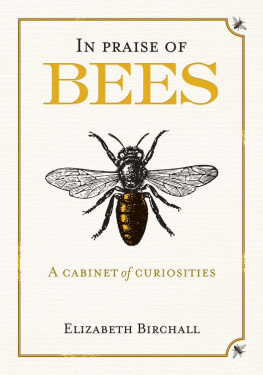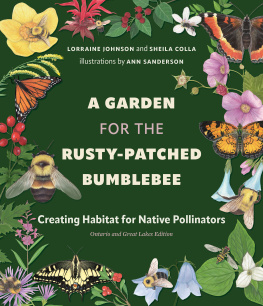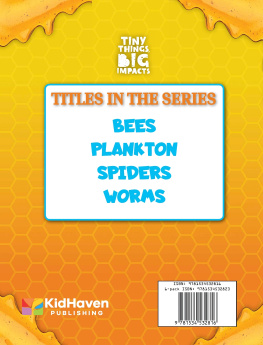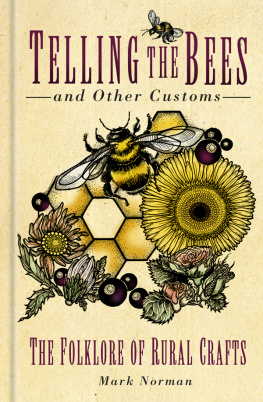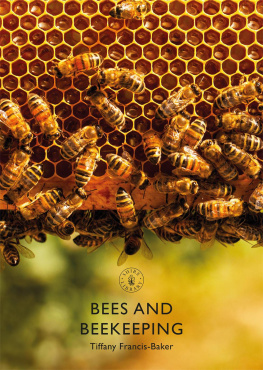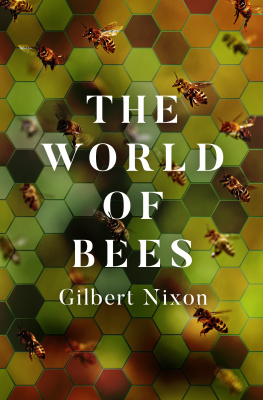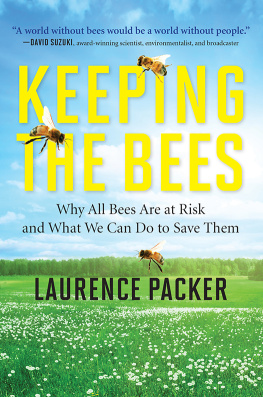I am deeply indebted to Polly Coles for her role as critical reader and for her confidence in the book. I cannot sufficiently thank Paul Embden, beekeeper and entomologist, for boundless access to his photographic hoard and expert appraisal of my modern scientific and practical content. I am also very grateful to Heather Leonard, beekeeper and friend, for her generous support with photographs and introduction to a demonstration meeting by the Oxfordshire Beekeepers Association at their Woodstock apiary.
I have received willing help from many staff at the Bodleian Library, Radcliffe Science Library, Natural History Museum Library, Sackler Library, and in the Print Room of the Ashmolean Museum, Oxford. Particular thanks are owed to Helen Gilio of the Bodleian Imaging Service for endless patience with obscure requests. I must also thank the following academics for help and advice on specific points in my wide-ranging book:
Dr Martin Brasier, Professor of Palaeobiology, Dept of Earth Sciences, Oxford.
Dr Paul Collins, Ashmolean Museum, Oxford
Dr Robert Johnson, Lecturer, History Faculty, Oxford.
Dr Stephen Johnston and Gemma Wright, Museum of the History of Science, Oxford.
Dr Carolyne Larrington, English Faculty, Oxford.
Dr Simon Lawson, Bodleian Library, Oxford.
Dr Claire Mellish and Dr Hilary Ketchum, Natural History Museum, London.
Katerina Nikolaidou, Vergina Archaeological Museum, Greece
Dr Heather ODonoghue, Professor in Norse Literature, English Faculty, Oxford.
Dr Ava Oledzka, Duke Humphreys Library, Oxford
Professor Rethemiotakis, Heraklion Archaeological Museum, Crete, Greece
Dr Claire Spottiswoode, Dept of Zoology, Cambridge
Natalia Yusefovich, Kharavosk University
Other specialist help has come from:
Jennifer Davis, Archive photographer, and staff at the National Trusts Wallington Hall, Northumberland
Richard Jones, Director Emeritus of International Bee Research Association
Paula Moorhouse, The Manchester Room, Manchester City Library
Johannes Paul, Omlet Ltd, Wardington, OX17 1RR
Pat Robinson and David Bondi, Rowse Honey Ltd., Wallingford, Oxon
Thanks for images to
Herefordshire County Libraries
Rothamsted Research Ltd
Dr Naomi Saville, University College, London
Unless otherwise attributed, poems and verse passages are by the author.
Lastly, I must thank numerous friends who have patiently listened to my preoccupations and excitements over the last several years.
While exploring such varied terrain I hope I have assimilated advice willingly given but must take responsibility for any errors that may remain. I have made every reasonable effort to obtain requisite permissions to reproduce copyright material but if there have been inadvertent errors or omissions the publishers will correct these in future editions.
Elizabeth Birchall, 2014
C ONTENTS
The chiefest cause, to reade good bookes,
That moves each studious minde
Is hope, some pleasure sweet therein,
Or profit good to finde.
Now what delight can greater be
Than secrets for to knowe
Of Sacred Bees, the Muses Birds,
All which this booke doth showe.
F rom prehistoric cave paintings, myth and the earliest of inscriptions through to our contemporary world, it is evident that honeybees have always fascinated people, and still do. Honey would have provided important nourishment and pleasure until sugar arrived on the table. Now there is urgent concern about bees fragile survival in an increasingly detrimental environment, given their cardinal importance as plant pollinators in the wild and in agriculture, the underpinnings of all life. But why did this humble insect take on such a rich freight of meanings across diverse cultures?
Cabinets of curiosities historically contained objects for enquiry or contemplation by (usually) gentlemen of leisure. I hope this cabinet of bee lore will similarly intrigue and please the reader. I have rummaged, not entirely randomly but certainly not exhaustively, in many drawers of myth, religion, politics, moral philosophy and folklore, and also include a selection of proverbs and quotations from among many poems featuring bees as well as some of my own verse. Evidently, earlier writers were unconcerned about intellectual copyright, freely ransacking others works, but when they disagreed invective could be fierce. I have assembled passages of literature on beekeeping from the classics; the many minds and pens that have translated Virgil have given me the pleasure of choosing variously. I draw from the exciting and excited beginnings of scientific anatomy, onward through an explosion of interest in effective hive design and the economics of beekeeping to the present day. I touch on current research programmes ranging from the major issues about bee populations to intriguing investigations into their perceptions and how their abilities might assist mankind, even in space exploration and landmine detection.
A measure of practical information has been gleaned from current authorities and my own limited hands-on experience but, while I hope to have avoided egregious errors, In Praise of Bees makes no claims to be an authoritative work of entomology or manual of the beekeepers craft.
C OMPANIONS IN D ISCOVERY: S OME N OTABLE B EE M ASTERS THROUGH THE A GES
Before moving into the thematic chapters, I offer brief details about the background and biographies of a number of prominent contributors to the bee world. Their words or ideas will be called on repeatedly in all that follows.
Aristotle (Fourth Century BC)
The great philosopher, teacher of Plato and Alexander the Great, was also a pioneering scientist and close observer of natural life who left us his History of Animals and Generation of Animals. Particularly interested in bees and keeping them in an observation hive, he made enduring discoveries, some of which were not confirmed until the nineteenth century. He was, like his successors for the next 2000 years, puzzled by bees sex and procreative habits.
Virgil (70-19 BC)
Born near Mantua, this farmers son became an esteemed court poet. After years of civil war during which Julius Caesar was assassinated in 44 BC, Virgil hankered for rural peace. Demobilised soldiers were resettled on his ancestral farm in the north but government compensation allowed him to buy new properties around Naples. After writing his pastoral Eclogues, in 30 BC he introduced his great paeon to bees in Book IV of The Georgics.
Of air-born honey, gift of heaven, I now
Take up the tale
Slight though the poets theme, not slight the praise
Aged forty, he wrote of approaching death, of furling his sails and hurrying his prow to shore, leaving no time to sing of his delight in gardens. In fact, he lived eleven more years and wrote his masterly

